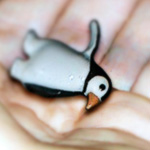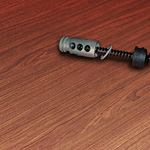 Several years ago the print shop I worked for went through one of its “employees first” episodes that typically develops in the fertile valley between layoff seasons. In an economy classified by irrational exuberance, the shop’s management were the very embodiment of giddy generosity, which I likened to a congregation of apple-cheeked uncles, fresh in from abroad, whose pockets were filled with all manner of exotic gifts for their favorite nephews. It was complimentary bagels every morning, and pizza for lunch on Fridays. Of course, during such periods of cherubic generosity a long memory would serve the employee well, in particular the understanding that a jocular manager should be treated with the same respect afforded to a freshly-fed pit viper: they’re only docile for the time being, but when that first hunger pang hits…
Several years ago the print shop I worked for went through one of its “employees first” episodes that typically develops in the fertile valley between layoff seasons. In an economy classified by irrational exuberance, the shop’s management were the very embodiment of giddy generosity, which I likened to a congregation of apple-cheeked uncles, fresh in from abroad, whose pockets were filled with all manner of exotic gifts for their favorite nephews. It was complimentary bagels every morning, and pizza for lunch on Fridays. Of course, during such periods of cherubic generosity a long memory would serve the employee well, in particular the understanding that a jocular manager should be treated with the same respect afforded to a freshly-fed pit viper: they’re only docile for the time being, but when that first hunger pang hits…
Desperate to avoid the euphoria overtaking them completely, management quickly set about the production of our annual performance evaluations, and the attendant reports were presented to us as nothing less than the revelatory maps with which we would ford a path to new personal insights and spiritual growth. And, in order to reassure the staff of the utter informality of the review process, the meetings would be held one-on-one, manager to employee, at the stations of each respective employee.
I felt like a buoy buffeted by the tide, helpless to extricate myself from the pomp and circumstance of the corporate friendship campaign. At a kindergarten field trip to the zoo, an animal handler once used my name when responding to a question I had asked, much to my shock. Recognizing my confusion, the man reminded me of the large magenta name tag affixed to my shirt, and my shock turned quickly to humiliation. When one is made to wear one’s name emblazoned so prominently, it does make one vulnerable to such forced intimacy. Similarly, there is no audience so captive as the employee set upon by her manager.
To the extent that there’s any explanation at all, this background may account for why I shoved a small ceramic penguin in my mouth moments before my manager paid me a visit. To be sure, nothing else could come close to explaining my deed, I simply felt the need to assert myself decisively. Very little forethought had gone into it, other than, “I wonder if I can sit through this entire performance evaluation without Klaus realizing that I have something in my mouth.” The ceramic penguin–one member of a suicidal penguin family that lives on my monitor–was simply the closest item within reach.
Continue reading
 It began like everything begins: with laziness, which is the true mother of invention. Let me just say that there came a time when I was tasked with moving a small appliance from one room to another room, and by sheer coincidence I realized at that exact same time that to subject myself to said mission would literally liquify my brain. What could be less engaging, after all, than picking something up from one place and putting it back down in another place? Material transferral has got to be the most cripplingly banal task a person could ever perform.
It began like everything begins: with laziness, which is the true mother of invention. Let me just say that there came a time when I was tasked with moving a small appliance from one room to another room, and by sheer coincidence I realized at that exact same time that to subject myself to said mission would literally liquify my brain. What could be less engaging, after all, than picking something up from one place and putting it back down in another place? Material transferral has got to be the most cripplingly banal task a person could ever perform. The Physics professor takes his place at my side five minutes later than usual. If the rest of the crew at the metro stop notices Nathaniel Whippingposte’s tardiness you could never gauge it from their outward appearances. Acknowledgement would be crossing that delicate social boundary that keeps a morning commuter safe from commitment. In all honesty, I can’t be certain that the man next to me is a physics professor at all, nor even that his name is “Nathaniel Whippingposte,” because I’ve never actually spoken to him. It’s not to say that we live in a society of strangers. In fact, I call this motley collection of characters “the crew” because we’re that tight-knit. We’re the regulars. Sure, there are the travellers through, the one-time companions, the sight-seers, but the core group remains. More than that, we all tend to stand in exactly the same spots from morning to morning, scattered, and equidistant from one another. Physics professor might call that a stochastic diffusion.
The Physics professor takes his place at my side five minutes later than usual. If the rest of the crew at the metro stop notices Nathaniel Whippingposte’s tardiness you could never gauge it from their outward appearances. Acknowledgement would be crossing that delicate social boundary that keeps a morning commuter safe from commitment. In all honesty, I can’t be certain that the man next to me is a physics professor at all, nor even that his name is “Nathaniel Whippingposte,” because I’ve never actually spoken to him. It’s not to say that we live in a society of strangers. In fact, I call this motley collection of characters “the crew” because we’re that tight-knit. We’re the regulars. Sure, there are the travellers through, the one-time companions, the sight-seers, but the core group remains. More than that, we all tend to stand in exactly the same spots from morning to morning, scattered, and equidistant from one another. Physics professor might call that a stochastic diffusion.